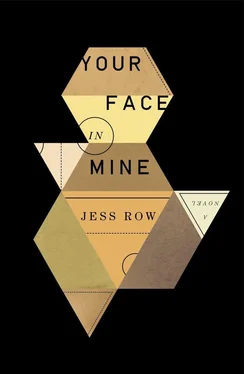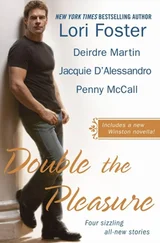I deleted it.
BS, man. It’s on YouTube.
My data plan’s off.
Okay. Fine. Martin takes out his phone, taps the screen, and hands it to me. I bookmarked it, he says. It’s Davis in front of a wavering camera, in an alley, or an abandoned lot, with two girls flanking him in matching black hoodies and pink wide-frame glasses. The audio isn’t tracked with the video, and I can hardly hear the beat through the phone’s tinny speakers, but I can hear Davis’s piping, slightly flat falsetto: I willed my keepsakes signed away — what portion of me I could make — assignable and then there interposed a fly — with blue uncertain stumbling — buzz between the light and me—
That was his class project, Martin says. For the Dickinson unit.
He’s gay, I’m thinking. For what good reason? Because he sings too high? Because he’s secretive and drawn into himself, because of the way he folds his legs, the delicacy of his fingers tapping the table like a keyboard? He’s gay, and Martin doesn’t know. Is it true? Would it matter, even if it was? All Martin’s trying to do is get him through twelfth grade. And give him the chance to unmake himself.
By the time he’s in college — say, three years from now — Martin will no longer be just Martin . The truth will be out. And another avenue of unmaking will be open.
I look at Martin’s face, and at Davis’s.
The truth is, I’m thinking, it could be almost anyone. There’s a fly beating against the glass of this thought. If the hole is deep enough. If the wanting is bad enough. Did I think we were special? Was Martin special?
Mom’s asking when I’ll be back, Davis announces, chin buried in his chest.
Okay, Martin says. Got to clean all this up first. Want some crabs? There’s extra.
Mom does that, he says. Cleans them and all. Makes crab cakes.
Stay just as you are, I want to tell him. Don’t go anywhere. Don’t go.
The second night of the L.A. riots, April 30, 1992, was also the night of L’Arc-en-Ciel’s biggest show, at the Spring Fling at Johns Hopkins. We were supposed to show up for sound check two hours early, but by four-thirty we were stalled in Alan’s living room with the TV on; our amps and cases stacked in the hall, my station wagon unloaded. Reginald Denny’s beating — the white man yanked from his cement truck, kicked, struck with a brick, left lying with his long blond hair splayed in blood on the asphalt, all filmed in the shaky lens of a helicopter camera — played in an endless loop on all four stations.
Alan sprawled across the couch, guitar in his lap, fingering chords silently and staring at the set list he’d written inside the back cover of Heidegger: Basic Writings . Martin had gone to the bathroom and never returned. I sat curled up in an easy chair, smoking one of Ayala’s Camel Lights from a pack she’d left on the mantelpiece. I hadn’t smoked since one obligatory trial cigarette in sixth grade; in fact I hated smoking, was opposed to it, considered it a form of mass corporate poisoning, an addiction factory, but I needed something to ease my ratcheting heart, and we didn’t have any weed in the house, and drinking was out. It was bad luck to drink before shows. And in any case my personal feelings about smoking, as about anything else, had never seemed more irrelevant, more like piss in the ocean.
I had been sitting, immobilized, for the better part of an hour, watching plumes of black smoke rising from South Central, lines of policemen with shields and shotguns, spidery looters carrying stereos and sacks of diapers through shattered windows. I had a splitting headache. I wanted to break my sticks, take a kitchen knife and slash my drum heads, or pour gasoline over the whole kit and set it alight, if that wasn’t such a cliché. Instead, I concentrated on each inhalation, trying to measure out a lungful of smoke, swallowing the dry cough and the urge to spit.
We can’t just play a fucking show , I said to Alan. Right? I mean, what do they want us to say? Happy fucking spring?
He got up and turned off the TV.
What the hell are you doing?
Enough, he said. Enough is enough. Just sit tight for a second.
I stood up to stretch my legs, and saw a flicker of movement in the window: Martin was standing on the front lawn. He’d taken his shirt off and hung it around his shoulders, and he stood, hands on hips, staring up at the mulberry tree that hung over the side of the house, now just beginning to bloom.
When Alan returned he held out a record for my inspection: Fugazi’s Repeater , lyric sheet turned up. “Styrofoam,” he said.
There are no more races to be run
There are no numbers left to be won
We are all bigots so filled with hatred
We release our poisons like Styrofoam
This is what we’re going to do, he said. To start with. Hold still. He popped the cap off the Sharpie and wrote something in block letters on my forehead. Now you do me, he said. Martin! Come here!
• • •
B igot , Alan’s forehead said.
Mine said Racist .
Martin’s: Burn This .
The songs we played, without more than a fifteen-second pause in between, were our angriest, loudest, most dissonant. That was all: three songs, and then two tall guys rushed the stage; one threw Alan off, into the crowd, and the other leaped over the guitar amp and then tripped on the drum riser and knocked three teeth out on the edge of the bass drum.
It happened, as they say, in slow motion, in a kind of sludgy, badly colored filmstrip: Alan balling up around his guitar in midair; Terc kicking a third guy off the stage as he tried to climb up; a complete stranger running right at me, for me, fists outstretched, and falling, and rolling across the stage with his hands wrapped around his face, blood running through his fingers. My crash cymbal was in my lap, the snare under my feet; a guitar cord whipped through the air; Martin’s bass cabinet groaned as someone knocked it over. Sirens; squawking megaphones; I pushed the hardware away and scooted off the stage to the left, thinking I would circle around and find Alan out front, and promptly, as I reached the stairs, tripped myself, and planted my elbow in a row of stage lights. I still have that scar.
Young man, says the elderly woman in the salmon suit next to me, nudging me with her elbow. Young man . It’s your turn.
She hands me the collection plate, full of bills, of course, fives and tens and a few folded inconspicuous ones. I’m on the aisle, and the deacon is already waiting beside me. I balance the plate on my knees, trying to let nothing drop, and reach for my wallet. Three bank receipts, a misplaced Acme Coffee Frequent Flier card, and a twenty.
In goes the twenty.
Did she notice? Her eyes stay locked on the choir, which is cooling off after a fast “What a Friend We Have in Jesus.” The deacon, who can’t be less than eighty, puts his hand on my shoulder as he shuffles to the next row. Possibly for balance. And at the same moment Martin, packed in with Sherry and Tamika and Robin in the row in front, turns around and gives me an assessing look. You okay? he mouths.
I nod and smile.
What else can I be here but a quiet, insignificant alien, an observer, a gap in the fabric? There are the women with enormous hats, great tilted slabs of taffeta and satin; there are men with two-toned shoes and matching purple ties and pocket squares; the choir wears burgundy robes with kente-cloth scarves; and the minister, Dr. Reginald Charles, looks a little like Samuel L. Jackson with deeper-set eyes and without the indignant stare. The air is thick with the smell of gardenias and hyacinths and musky cologne. And those of us without fans are fanning ourselves with our programs. It’s hitting all the marks, as Martin said it would, when he gave me the address over the phone yesterday. Don’t come expecting to be surprised. Moved, maybe. Overwhelmed. It’s not about subtlety. Sometimes even Robin gets a little embarrassed. She’s not sure she wants you to come.
Читать дальше












